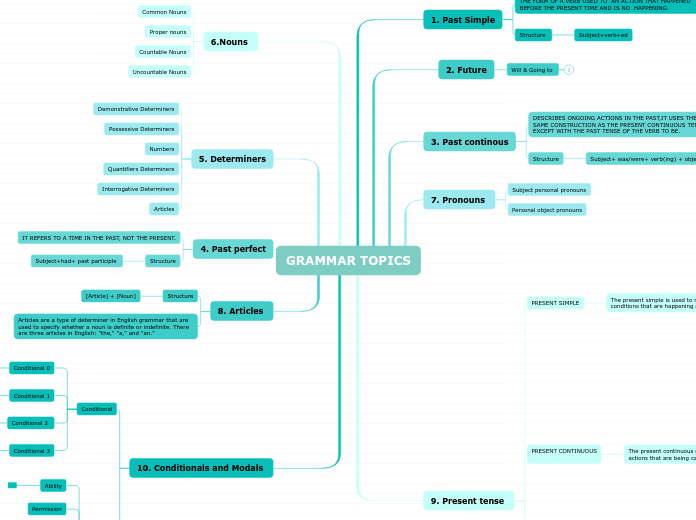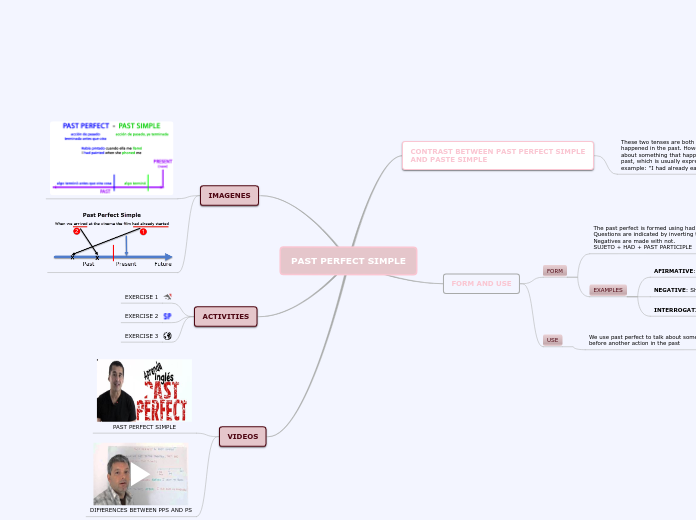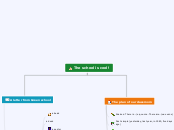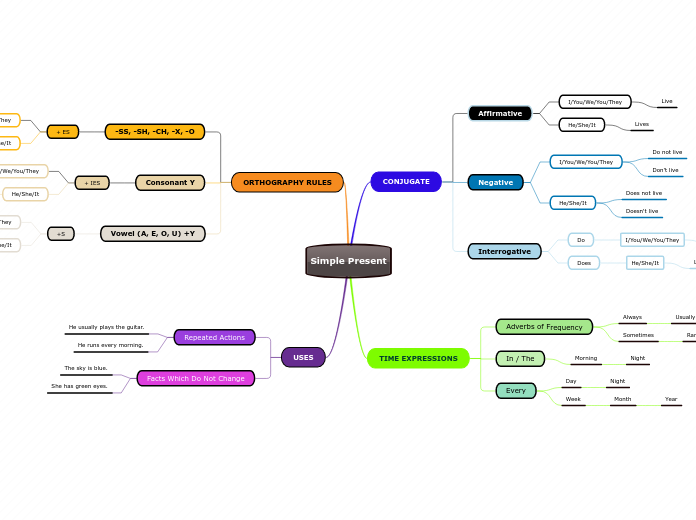GRAMMAR TOPICS
Type in the title of your course.
10. Conditionals and Modals
Modals
Possibility
Obligation
Advice
Permission
Ability
Conditional
Conditional 3
Things thatcan't happen
Conditional 2
Imposible things
Conditional 1
Possible things
Conditional 0
True facts
8. Articles
Articles are a type of determiner in English grammar that are used to specify whether a noun is definite or indefinite. There are three articles in English: "the," "a," and "an."
[Article] + [Noun]
4. Past perfect
Subject+had+ past participle
IT REFERS TO A TIME IN THE PAST, NOT THE PRESENT.
5. Determiners
Select methods and tools according to
- the size of the class
- the course goals
Articles
Interrogative Determiners
Quantifiers Determiners
Numbers
Possessive Determiners
Demonstrative Determiners
6.Nouns
The evaluation must go hand-in-hand with course goals in order to achieve them and also help students to improve their skills.
Also, assignments and homework need to reflect and help achieve course goals.
Uncountable Nouns
Countable Nouns
Proper nouns
These can be partial - short evaluations after each segment of the course - or final - a final exam which will assess all the knowledge aquired during the school year at once.
Common Nouns
Decide if you want the assignments completed during the year to represent 1/3 of the final grade.
9. Present tense
PRESENT PERFECT CONTINUOUS
The present perfect continuous are unfinished actions, that is, they began in the past and continue in the present moment
PRESENT PERFECT
The present perfect is a verbal tense that is used to express a relationship of action between the present and the past.
in Negative
I haven’t taught
You haven’t taught
He/She/It hasn’t taught
We/They/You haven’t taught
in Affirmative
I have taught
You have taught
He/She/It has taught
We/They/You have taugh
PRESENT CONTINUOUS
The present continuous generally refers to situations or actions that are being carried out at the moment
in Negative
I ‘m not working
You aren’t working
She/He/It isn’t working
You/We/They ren’t working
in Affirmative
I am working
You are working
She/He/It is working
You/We/They are working
PRESENT SIMPLE
The present simple is used to refer to events, actions, and conditions that are happening all the time, or exist now.
in Negative
I don’t teach
You don’t teach
She/He/It doesn’t teaches
You/We/They don’t teach
in Affirmative
I teach
You teach
She/He/It teaches
You/We/They teach
7. Pronouns
Personal object pronouns
Subject personal pronouns
3. Past continous
Arrange the topics in a logical order.
Discuss how and why you have organized the material in a particular way.
This will help students to see the connections between topics.
Subject+ was/were+ verb(ing) + object
DESCRIBES ONGOING ACTIONS IN THE PAST,IT USES THE SAME CONSTRUCTION AS THE PRESENT CONTINUOUS TENSE EXCEPT WITH THE PAST TENSE OF THE VERB TO BE.
- Chronological - you can organize the topics according to a theme or storyline.
- Topical order - involves taking the topic of your speech and dividing it into several subtopics. The subtopics are related to the topic they branch out from.
- Survey-oriented - this type of course structure is briefly treating the main topics of a broad field of knowledge.
- A process-oriented syllabus focuses on the skills and processes involved in learning.
ChronologicalTopicalSurvey-orientedProcess-oriented
We use ing
2. Future
Select the major topics and determine the order in which you will teach them.
Will & Going to
Select the main topics to be covered. To obtain an initial list of course topics, search in current textbooks or in the current literature.
Will
Subject+will+infinitive+complement
Talk about future at the moment of speaking
Going to
Structure
Subject+am/is/are+going to+infinitive
Used for plans made before the moment of speaking
1. Past Simple
Determine the goals of the course.
Having these course goals in mind will then help you make decisions about which content to include and what kind of assignments and exams are appropriate.
Consider the following questions:
- What you want your students to remember from your course?
- What skills should students gain in this course?
- How does this course relate to other courses in the discipline?
Structure
Subject+verb+ed
THE FORM OF A VERB USED TO AN ACTION THAT HAPPENED BEFORE THE PRESENT TIME AND IS NO HAPPENING.
Add ed









